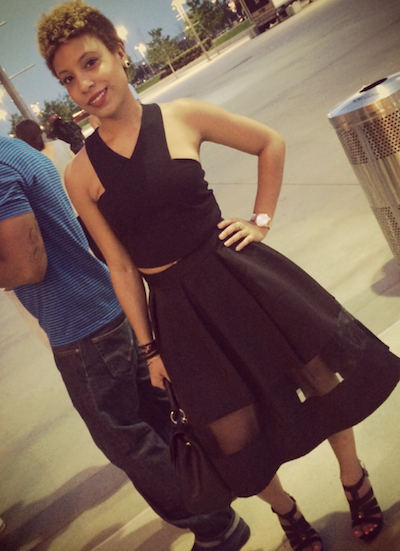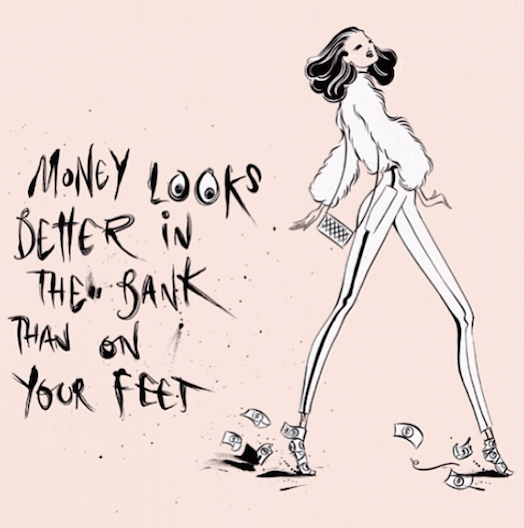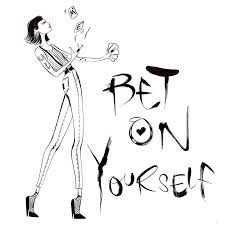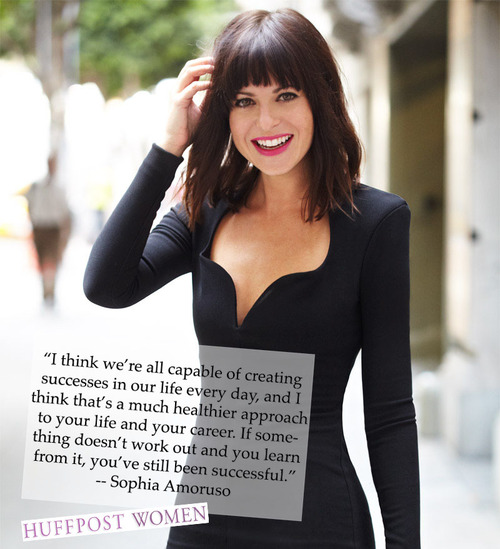I’m not a fashion gal. And I hate shopping.
Call it the result of being forced to spend hour after hour shopping with my mother. Ma can (and does) shop from sun up to sun down. From St. John’s suits to a quaint San Francisco boutique to an outlet mall, if shopping is involved, she’s down. My grandmother once joked that Ma should quit her 20 plus year career in higher education, move to L.A. and become a personal shopper to the stars. I concurred. Ma laughed at the idea.
I wear what I think looks good on me. I admire the legion of fashionable women in NYC who pair high and low pieces or vintage and chic to make a fly ensemble that I would’ve never imagined. People’s personal style is intriguing, but I doubt I’ll ever be the chick who loves to shop, gawks at the glossy pages of Vogue, knows high end designers or will scour a thrift store rack for hours.
For all those reasons I was clueless about Nasty Gal’s founder and CEO, Sophia Amoruso. The one time I thought I should shop more online and less in Soho, I ran across a blog post that listed Nasty Gal as one of the top sites for women’s clothing. I still had no clue who Sophia Amoruso was until about a week ago.

What I wore to the Jay & Beyonce #OntheRun concert. Dressed in all black like the omen. See? Not a fashion killer.
Sophia turned Nasty Gal into a $100 million business in seven years. Homegirl started the business on her couch selling vintage clothes on ebay. How did she do it? That’s where #GIRLBOSS comes in as a half-memoir, half-business guide. Her cult following and the massive media push ensured #GIRLBOSS would spend 10 weeks on The New York Times Bestseller list since its release in May.
When pictures of #GIRLBOSS crept into my Instagram feed I rolled my eyes. Hard. I figured it was another Lean In, which I’m ok never reading in life for reasons mother bell hooks and other feminists have pointed out.
But for some reason #GIRLBOSS appealed to me more than Lean In ever did. I tweeted that I was going to give it a try hoping people who had read it would hit me with a yay or nay. My guy friend saw my tweet and texted me shortly after.
“Hey. If you want the girl boss book I’ll send it to you. The ebook.
For the free?
“Yes, please!!!!” And so it began.
I started the book on a Thursday evening and had finished by Saturday afternoon. It was a super easy read. Basically #GIRLBOSS is Amoruso’s abridged story of a chick who went from Subway sandwich maker to unemployed to petty thief to CEO and Founder of a $100M business in seven years, all by the age of 30. It’s unheard of and was enough to pique my interest.
Homegirl was a mess. But the mess actually turned into being what Steve Jobs calls “connecting the dots” because it all led to who she eventually became. Sophia moved out of her parents’ home before finishing high school, stole, hitch hiked with strange men, slept on couches, got fired from several jobs and probably never made more than $14/hour at any job before starting Nasty Gal. Her personal story is what led me to read the book.
We have very different journeys, but loads of personality similarities—we’re both Aries— if that tells you anything. As you’ve read, I’m on this positive journey so I’d like to not give shine to the things I dislike. But I’m a writer and a critical thinker. That will never go away. So before we get to what I didn’t like, let’s start with what I did.

Advice & illustrations from #GIRLBOSS
LIKED….
1. A life worth writing about
For me this is the draw of the book. Like Sophia, I have not led the straight and narrow path. Neither has Oprah or a lot of other “girl bosses.” Sophia makes it clear from jump she never intended to start Nasty Gal as this massive business that would make her rich. All the missteps she took certainly didn’t indicate she’d land on Forbes and Inc’s top lists of the year. She owns her weirdness. Her honesty about being an introvert, sarcastic, a reformed thief and her success kind of just happening unintentionally is refreshing.
2. All the ladies who’re independent, throw your hands up at me
The chick is a real self-made millionaire. To grow a business that pulls in over $100 million annually in seven years is major. To do so without any debt is something of a miracle. She never borrowed one dime from the bank to finance her business. Investors didn’t come calling until she’d already made mad money. Sophia really did make an empire with her own sweat and tears. I doubt any blood was shed.
3. “Stay humble, but let these n*ggas know”
No, this white girl didn’t say that or anything remotely close. But the popularly quoted IG post applies here. I have no clue if she’s humble in real life, but I didn’t get a lot of boasting from #GIRLBOSS. I did get from it that she knows what she’s accomplished and is damn proud of it. There were times she would let you know flatly: I’m a “bad bitch” (yes, she uses that phrase quite a few times), I did this while living in a Bay area apartment full of thrown out furniture and now I’m running shit. I’m not mad at that.
4. If you don’t do anything else in life, be your freaking self
I know a thing or two about the publishing industry. I personally do not believe Sophia wrote the book because, well, she’s not a writer. That’s what ghostwriters do. Call me for book #2, girl. Whoever wrote it captured Sophia’s quirkiness and realness. She cursed like hell. She didn’t kiss anyone’s ass. She proudly admitted she hated NYC’s Fashion Week. So.Do.I. Barf! There was a theme throughout about daring to always be yourself. It’s actually authenticity that leads to success, which is what most rich people will tell you. Being herself and playing to her strengths is exactly how she created Nasty Gal with zero knowledge in business.

DIDN’T LIKE…
5. For the youngins
I’m 29. This book ain’t for me or anyone over 21. It’s very much a book about her story. “Hey, I’m Sophia. I’m only 30. I run a $100 million dollar business. I had no plan. But I ended up here.” It’s simple. Compelling, but simple. I’m not sure anyone who has been in the workforce for over three years would gain much from #GirlBoss that you didn’t already know.
6. Don’t expect any real advice on how to be a boss
Sophia is like Rick Ross. Constantly hollering/grunting, “I’m a boss,” but very little direction on how to be a boss or what all it entails. The few tips go something like: spell check your resume (bitch, who doesn’t know that?), be polite, know when to shut up and don’t write a cover letter that’s all about what you want from the employer. To be fair, I did think tips like save 10% of every paycheck in a separate account and changing all your passwords to inspirational phrases were cute tidbits. However, I wanted to know more about how she navigates being a boss as a woman. Does she struggle with people taking her less seriously because of her age? How does she deal with sexism in the boardroom? How does she remain stern without being considered a bitch? The chapter on hiring and firing probably had the most tips, but it wasn’t meaty with information. Firing someone is inevitable, she says. Don’t tell the person you’re firing it’s harder for you than it is on them because that’s a crop of shit because they’re now unemployed. Duh! What else, Sophia?
7. Keep feminism’s name out your mouth if you don’t really get it
In the very first chapter she addresses the F word.
This book is titled #GIRLBOSS.
Does that mean it’s a feminist manifesto?
Oh God. I guess we have to talk about this.
#GIRLBOSS is a feminist book, and Nasty Gal is a feminist company in the sense that I encourage you, as a girl, to be whom you want and do what you want. But I’m not here calling us “womyn” and blaming men for any of my struggles along the way.
Girl, stop. Because that’s all feminists do is refer to themselves as “womyn” and blame men for their struggles. This is idiotic and shows a deep lack of knowledge on what feminism is truly about. Why even write something so…misguided?
I believe the best way to honor the past and future of women’s rights is by getting shit done. Instead of sitting around and talking about how much I care, I’m going to kick ass and prove it…Is 2014 a new era of feminism where we don’t have to talk about it? I don’t know, but I want to pretend that it is.
Bye, Felicia. I don’t care how she identifies. I do care when your one sweeping generalization of feminism is the tired trope that all feminists do is whine about the problems men have created as if misogyny, sexism and patriarchy aren’t real issues globally. I don’t expect a 30-year-old rich privileged chick to be well read on bell hooks or Gloria Steinem, and it’s obvious she is not. Fine. Just keep feminism’s name up out your mouth.

8. School ain’t for everybody, but everybody can’t afford to not go to school
College is not for everybody. Student loan debt is a crisis in this country that needs to be seriously dealt with. Sophia barely graduated high school. Community college didn’t stick either. She found success without it as have others like Mark Zuckerberg and Steve Jobs. But notice anything about all of them? You guessed it: White. Black folks at large can’t afford to not go to college. The statistics for poverty show that the numbers are exponentially higher for black people without college degrees. Hell, even Oprah has a college degree (from my beloved HBCU, #TSU!).
This anti-school attitude is not for black folks. The same rooms she can walk in to have meetings with big time investors with only the knowledge she learned via Google and from running a company? We can’t even get in those rooms with Ivy-league degrees let alone without them. This sentiment throughout the book really bothered me because I know she was writing it from a perspective of white privilege that she doesn’t even realize she has. I worked damn hard for my undergraduate and postgraduate degrees just to have the publisher of a magazine once tell me my Master’s was antiquated. Because a black woman who is both younger and higher educated than him means my degree is “antiquated.” Right. So for the young black adults reading #GirlBoss, you need to go to school or learn or trade or have a damn good plan with money to fund your plan. Continue living by the creed we all know to be true: We have to work twice as hard and be better than them just to be on an equal playing field. That will never change, even once we’re bosses.
9. All optimism is not created equally
At the crux I do believe that with hard work, belief in yourself, taking risks and following your dreams you can become whatever you want. Only it’s really not that simple, especially for women, especially for women of color. Sophia gave no real nod to any real hardships she had to face. Nor did she mention how her “put your head down and do the work” tactic could still limit certain groups from succeeding, or could take them 20 years to do what she did in seven.
10. Learn when to leave the party early
This book could’ve ended at its halfway point. It nailed the point that she was an outcast her whole life for way too long. We get it, honey. Without any elaborate advice on how to be a boss it started to drag like she just needed to fill the pages.
This book wasn’t written for me, and I think that’s fine. Everyone has a target demographic they cater to. And typically since I don’t support people or businesses that let me know they couldn’t care less about speaking to me as a black woman, I’m glad I didn’t pay for it.
I am glad I read it though. Her story is interesting enough. Although I didn’t find a ton of helpful gems (there were a few) I can’t hate on a self-made woman. Book aside, she went from couch surfing and dumpster diving to managing over 350 employees, saving $1 million in her personal bank account and paying cash for a Porsche all before the age of 30. That in itself makes you at the very least interested in what she has to say about success. Once you read the last page you can go back to your life before you knew who Sophia Amoruso even was.
And all will be well in the world.
